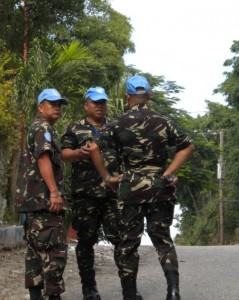by Yves Engler. Originally posted at Canadian Dimension

Step one for everyone trying to make the world a better place should be listening to those they wish to help.
This is certainly true in the case of Haiti, a long-time target of Canadian ‘aid’. But, while Haitians continue to criticize Ottawa’s role in their country, few Canadians bother to pay attention.
After Uruguay announced it was withdrawing its 950 troops from the United Nations Mission to Stabilize Haiti last month, Moise Jean-Charles, took aim at the countries he considers most responsible for undermining Haitian sovereignty. The popular senator from Haiti’s north recently told Haiti Liberté:
Brazil, Argentina, and Uruguay are not the real occupiers of Haiti. The real forces behind Haiti’s [UN administered] military occupation — the powers which are putting everybody else up to it — are the U.S., France, and Canada, which colluded in the Feb. 29, 2004 coup d’etat against President [Jean-Bertrand] Aristide. It was then they began trampling Haitian sovereignty.
Continue reading The real story about Canada’s role in Haiti



